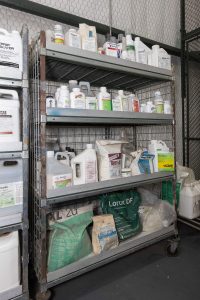When to Fertilize
So, you’ve read How to Choose a Fertilizer, and How to Apply Fertilizer, but what about when to apply fertilizer?
Depending on what you plan to fertilize, the timing application may differ. For example, it is best practice to apply fertilizer to turfgrass only when it is actively growing. Turf will not absorb any fertilizer when it is dormant.
Dormancy for warm season turfgrasses, such as bermudagrass, St. Augustinegrass, zoysiagrass and bahiagrass begins in mid-October through mid-March or early April. Do not fertilize turfgrass during these months (note: some counties/municipalities have fertilizer black-out dates so call your local UF/IFAS Extension Office for ordinance information specific to your area).
Fertilizing turfgrass during these months can lead to cold damage/death, a waste of money and time, and lead to water pollution. Fertilizers contain nitrogen and phosphorus which cause algal blooms, red tide, fish kills, etc. Whatever is applied to plants, if it is not readily taken up and used by the plant, eventually finds it’s way into water resources due to the nature of our sandy soils and heavy rains which causes runoff.
Read more about Fertilizing Your Florida Lawn and General Recommendations For Fertilization Of Turfgrasses On Florida Soils.

When Do Plants Need Fertilizer?
Fertilizing is not one size fits all. There is not one definitive time that all plants need fertilizer. Truth is, all plants differ in their growing seasons, nutrient requirements, and growth pattern. So, the right time to fertilize is going to be based on the needs of the specific plant.
Also keep in mind that established trees and shrubs do not generally need fertilizer, only young plants that haven’t yet become established need fertilizer. To be certain, use a soil test to determine what, if any, fertilizer is needed by established trees and shrubs.

You’ll want to match the applications to the plant growth pattern and nutrient demands throughout the season. Meaning, you’ll want to fertilize them when they’re actively growing and hold off when they’re dormant. Regular fertilizer applications keep plants vigorous and productive, but the goal is to give the nutrients to the plant when they are most likely to absorb them.
Too much fertilizer or adding fertilizer at the wrong time can damage and burn plants. In a garden, if you overfertilize tomatoes and beans, you will get lots of pretty green foliage, and little fruit! In the case of fertilizer, more does not equal better!
Read Fertilizing – Maintenance – Landscape plants – Edward F. Gilman – UF/IFAS (ufl.edu) for more fertilizing timing and practices and details for veggie gardens.
Conclusion
The key to successful fertilization lies in timing it just right. Remember, each plant has its own unique needs and growth patterns, so it’s crucial to match fertilizer applications accordingly. By fertilizing during periods of active growth and avoiding overapplication, you’ll ensure your plants receive the nutrients they need to thrive without risking damage. Happy gardening!
Read more about fertilizers in our Fertilizer Fundamentals series:
- Fertilizer Fundamentals: How to Choose the Right One – UF/IFAS Extension Pasco County (ufl.edu)
- Fertilizer Fundamentals: How to Apply Fertilizer – UF/IFAS Extension Pasco County (ufl.edu)
Have a question?
If you have any questions about gardening in Central Florida, please contact UF/IFAS Extension Pasco County at 352-518-0156. For more information on UF/IFAS Extension Pasco County Community Gardens, and how you can join one, visit http://sfyl.ifas.ufl.edu/pasco/. Supervising agent: Dr. Whitney Elmore.
Follow us!
We have several ways to connect. Visit our Facebook, Instagram, Eventbrite, Blogs, Florida-Friendly Facebook, & Website.
Visit our page for more tips and tricks on maintaining a home garden!
More resources from UF/IFAS Extension Pasco County:
- UF/IFAS Extension Pasco County
- UF/IFAS Extension Pasco County Community Gardens
- Dr. Whitney Elmore’s Podcast: Rooted in Florida
More from UF/IFAS Gardening Solutions:
- The Basics of Fertilizer
- Compost
- Fertilizing Your Florida Lawn
- Organic Soil Amendments: Compost, Manure, and More
- Palm Nutrition
- Pesticide and Fertilizer Disposal
- Right Fertilizer, Right Place
- Trash Talk: Alternatives to Traditional Composting
- Types of Fertilizer
- Vegetable Gardening in Florida: Applying Fertilizer
- Vegetable Gardening in Florida: Selecting a Fertilizer
 4
4
